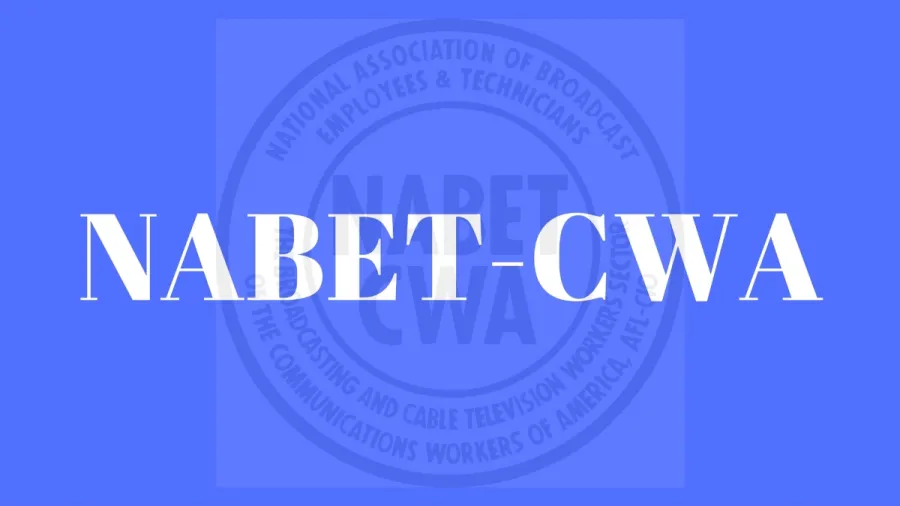Organize - Join Our Union

Welcome to the organizing page for NABET-CWA. By visiting here, you and your coworkers are taking the first step towards joining NABET, a fighting, democratic union that puts members first.
Welcome!
Bera Dunau is the Organizing Coordinator for NABET-CWA. In the role of Organizing Coordinator, his full-time job is to help workers in the broadcasting industry organize their workplaces. If you want to talk to Bera about what that will entail, you can email him at [email protected]
NABET-CWA is the Broadcasting and Cable Sector of the Communications Workers of America, which includes workers in newspapers, airlines, manufacturing, and telecommunications, among other industries. The CWA is one of the strongest, most progressive unions in North America, and it helps workers everywhere to advocate for themselves and their communities against the toughest of opposition.
The origins of the National Association of Broadcast Employees and Technicians date back to 1934. Today, NABET-CWA members help produce and create material broadcast on radio, television, cable, the internet, and various streaming platforms. At NABET-CWA, we organize industrially, meaning that if you work in a broadcasting workplace, whether you do production work for a podcast, anchor for a television station, do maintenance at a cable access station, or publicity at a streaming company, we would love to help you organize.
In the digital age, we at NABET-CWA take an expansive view of what broadcasting means, so if you’re wondering if your workplace would qualify as a NABET shop, please contact our organizing coordinator at [email protected]. Even if NABET isn’t the right fit for your workplace, we would be happy to refer you to a more appropriate Sector of the Communications Workers of America.
Below are some resources to help you get started on your organizing journey:
What is a union?
A union is a group of workers who band together to create a democratic organization to give themselves a voice and power on the job. Unions negotiate with employers to bargain contracts on their members' behalf and also serve as a legal vehicle that members can utilize to stand up for one another.
Wages, benefits, layoff protections and procedures, and just cause protections against arbitrary disciplinary action are some things that members negotiate and which are memorialized in union contracts.
Unions, particularly unions within the CWA family, are also on the frontlines of struggles for social justice, fighting against racial prejudice, for LGBTQ rights, and for women’s bodily autonomy. By forming a union with NABET-CWA, you and your co-workers will be joining a proud tradition -- the union tradition -- that has fought for more than a century for human rights and human dignity and continues to do so.
How do I organize my workplace?
Get in touch with an organizer! NABET-CWA’s organizing coordinator is Bera Dunau, and those interested in organizing their workplaces can email him at [email protected].
In a confidential conversation, your organizer will walk you through the steps you need to organize your workplace. Should you and your fellow workers wish to continue with the unionizing process, and if your shop is a good fit for NABET-CWA, your organizer will help you form an organizing committee.
As a committee, you and your fellow workers will build and strengthen relationships with your coworkers as you make the case for a union and build up a supermajority of support.
Once you have achieved a substantial supermajority, you and your fellow workers will make your intentions to form a union known to your employer. At this point, your employer could voluntarily recognize your union. More likely, they’ll insist that an NLRB union election be held.
The good news is that by this point, you should be well-equipped to win an NLRB election because winning that election only requires a simple majority of those individuals who cast a vote. So, if you can keep your supermajority strong and get your people out to the polls, you will win.
Once you’ve won your NLRB election, your employer must bargain with you in good faith. You and your fellow workers will determine what terms and employment conditions you want to bargain for through crafting and distributing surveys and holding meetings. Once the shop has defined its priorities, you’ll elect a bargaining committee that, with the help of staff, will fight for a good deal at the bargaining table. These efforts will also be aided by you and your fellow workers applying pressure in the shop and the community on the employer to reach a fair deal through mobilization -- actions that include wearing union gear to work, picketing employer events, and boycotts, among many others.
Once you have a union contract, you and your fellow workers will use it as the basis for advocating for one another in the shop. And if all goes as expected, you’ll return to the bargaining table to negotiate a successor agreement in a few years.
What rights and protections do I have when organizing?
Under Section 7 of the National Labor Relations Act (NLRA), you have the legal right to:
- Attend meetings to discuss joining a union.
- Read, distribute, and discuss union literature (as long as you do this in non-work areas during non-work times, such as during breaks or lunch hours).
- Wear union buttons, t-shirts, stickers, hats, or other items on the job.
- Sign a card asking your employer to recognize and bargain with the union.
- Sign petitions or file grievances related to wages, hours, working conditions, and other job issues.
- Ask other employees to support the union, to sign union cards or petitions, or to file grievances
It should also be emphasized that any form of retaliation for union organizing is illegal, and NABET-CWA fiercely defends workers who are targeted in this way. Our union has a seasoned legal department, strong political connections, and a membership that does not tolerate union busting. NABET-CWA has successfully gone toe-to-toe with some of the biggest corporations, and will do so anytime to defend those organizing with us.
What opportunities does NABET membership open up?
Fundamentally, forming a union with your co-workers will give you a democratic voice in your workplace and the power to advocate for yourselves. However, union membership also opens up opportunities for training and career advancement.
Additionally, NABET provides ample opportunities for members to get involved with union work as volunteers, elected officers, and staff. We are a fighting union, and if you want to be on the frontlines of creating a better world in the broadcasting industry, we gladly welcome you.
Tips to win your organizing campaign
Congratulations if you and your fellow workers have decided that organizing a union with NABET-CWA is right for you! You have begun a process to empower those working at your shop and the workers who will come after you. But to form a union, you will first have to win one. Here are some good tips on how to achieve such a lasting victory.
- Regular, consistent effort is better than irregular amounts of heroic work.
Many people who decide to help organize their workplaces habitually put too much work on their shoulders. While this can be admirable, such action can also lead to burnout. You will achieve good organizing results from consistent effort when you know how much work you can sustainably take on. A worker who does 2 hours a week of organizing for a year is far more valuable than one who does 10 hours a day for two weeks before stepping away from the campaign for several months.
- It’s all about building relationships with your coworkers.
Fundamentally, organizing a union is about getting you and your coworkers to believe that a better workplace is possible and that you can achieve this by building a democratic organization together. Getting to that place, however, requires a level of trust and communication with coworkers that many of us do not have. That’s why so much of organizing involves building relationships until they’re strong enough to have organizing conversations safely.
- Stay in contact with your organizer and meet regularly.
While you and your fellow workers will be the driving force behind organizing your workplace, you won’t be doing it alone. You’ll be building up your union with the help of an organizer whose job it will be to share their experiences, offer guidance, and provide you with the resources needed to help you succeed. This can only happen, however, if you remain in regular contact with them. Schedule and attend weekly meetings with your organizer and contact them as questions and concerns arise. They can only help you if they know what’s going on!
- Always emphasize that the union is all of you.
One of the most common anti-union tactics is to “third-party” the union, where the employer will assert that the union is some kind of outside force. That’s why you and your coworkers must take ownership of the union you are building every step of the way. A NABET-CWA shop is a democratic organization that elects its leaders and makes decisions based on the majority's will. In that spirit, be inclusive in your organizing and allow everyone to have their voices heard. At the same time, make sure to emphasize respect for the decisions you make collectively and to move forward together after a democratically determined decision has been reached.
- Have fun!
Organizing a union is a serious business. Many people seek to form a union with their coworkers to fight for better pay, against discrimination, and basic workplace safety. But just because the stakes in organizing are high doesn’t mean you and your fellow workers can’t have fun doing it. Organizing social events like concerts, fundraisers, and movie nights can build solidarity and camaraderie within your shop, strengthen your bonds as co-workers and trade unionists, and brace you all for the potentially challenging times ahead.
